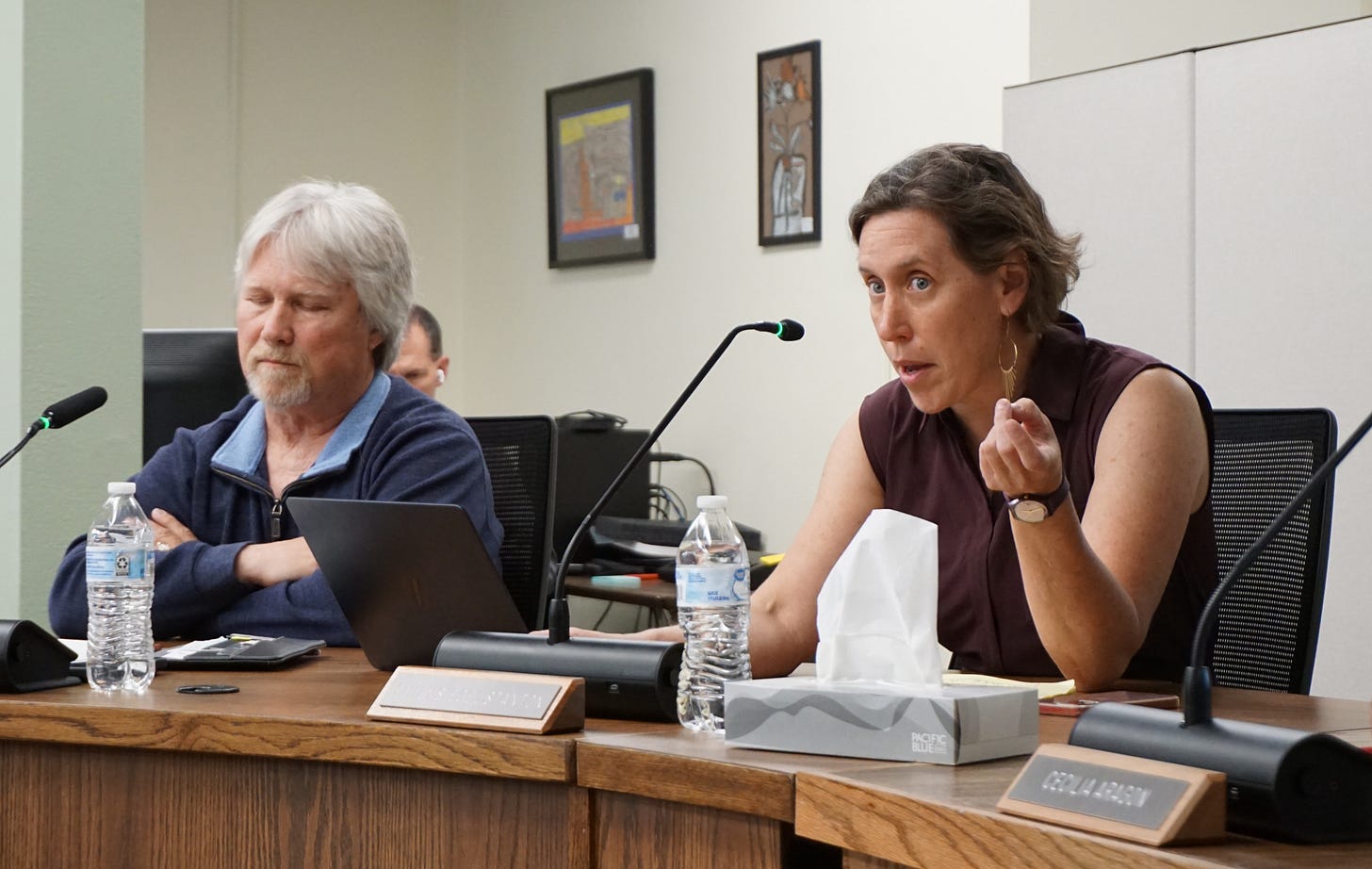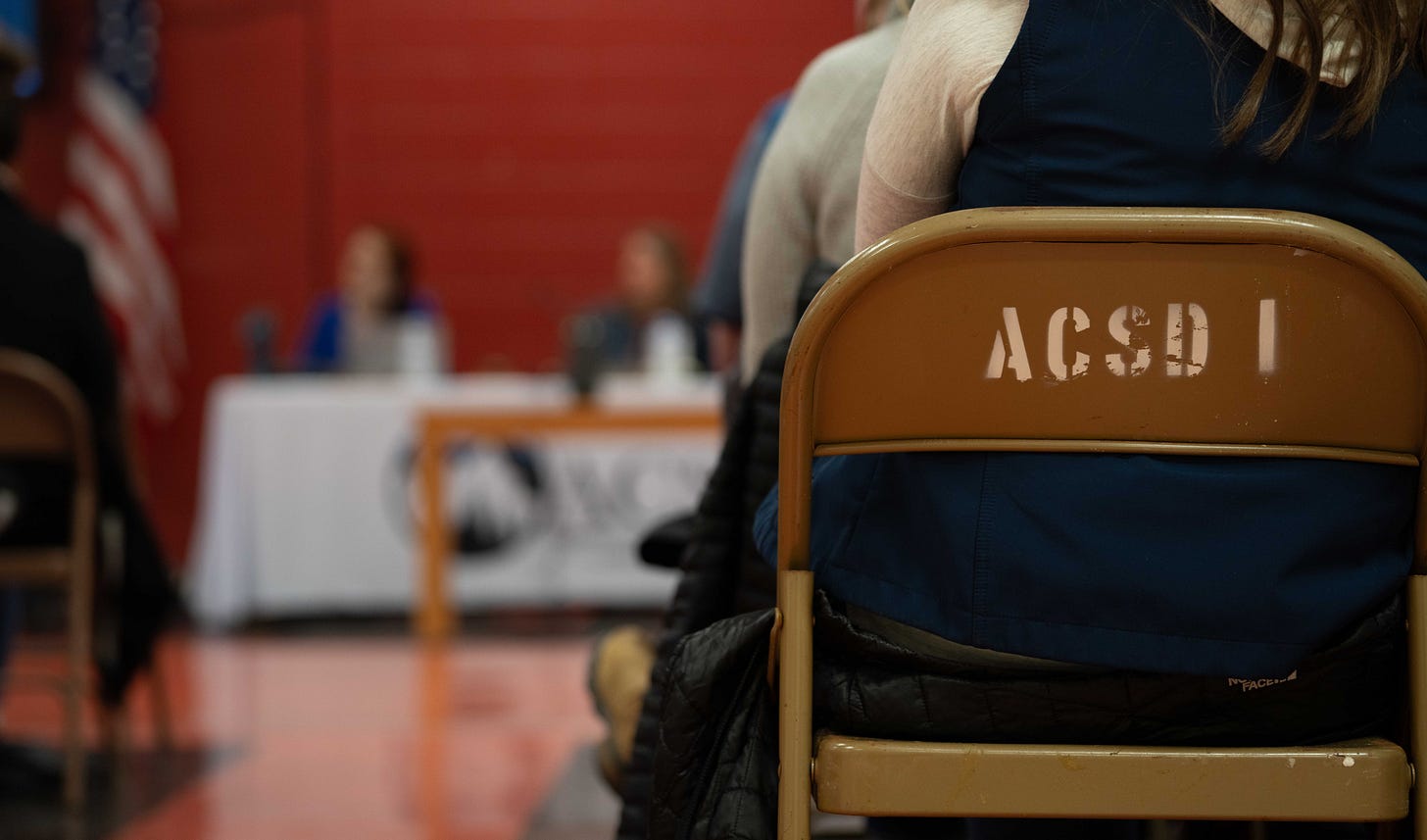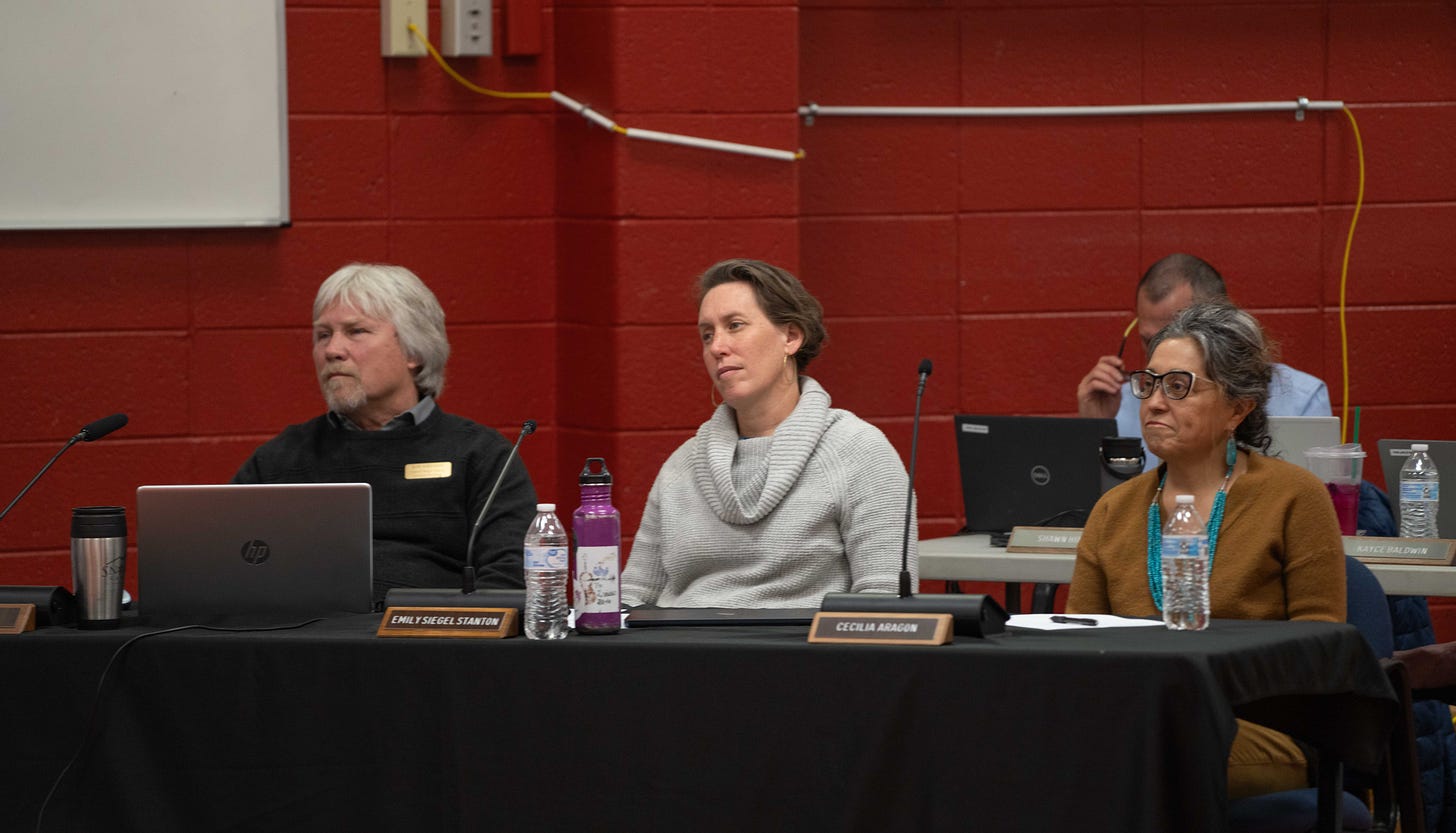School board races pit challengers against incumbents
No matter the results, at least seven of the board’s nine seats — but possibly all nine — will remain unchanged following the 2024 General Election.
There is less interest and less at stake in this year’s school board elections than in 2022.
Whereas the last election saw 20 candidates competing for seven available seats, 2024 has drawn only six total candidates for four available seats.
With three incumbents running for the three seats in Area A and one incumbent running for the single at-large seat, voters have the opportunity to ensure the school board of 2025 is identical to the school board in place at the moment.
But with a single challenger in both races, voters also have the opportunity to shake up the board ever so slightly.
For Area A, voters will decide three winners from a field of four:
Cecilia Aragón, who was first appointed in 2023 and is standing for her first election.
Sylvia-Grace Fonfara, who has not held office before and is the only challenger in this year’s race for Area A.
Alex Moon Krassin, who was first elected in 2022 to serve the final two years of an unexpired term.
Emily Siegel-Stanton, who was first elected in 2020 and is standing for reelection.
For the single at-large seat on this year’s ballots, voters will decide one winner from a field of just two:
Kim Sorenson, who was first elected in 2020 and served as the board’s chair in 2023.
Tom Mullan, who has not held office before, but ran in 2022 as a member of a right-wing slate that failed to gain any seats.
All voters in Albany County vote in all school board races. The “areas” attached to the seats refer to the candidates’ home addresses; they limit candidacy not voter participation.
The General Election is Nov. 5.
The incumbents in Area A
In Area A, Siegel-Stanton, Aragón and Krassin want to continue what they started.
“It just feels like we’re still in the middle of a lot of flux,” Siegel-Stanton said. “And I wanted to keep being a part of trying to figure it out and see it through to a positive end.”
In the four years since Siegel-Stanton joined the board, the district responded to the COVID-19 pandemic. It was a contentious — and sometimes even litigious — issue for the board itself, which had to shut down two separate meetings following disruptions from anti-mask parents and activists.
Krassin joined the board following the 2022 election and Aragón joined in the summer of 2023.
Together, the three incumbents have been involved in the work to fix the district’s budget — a process that has included cutting some extracurriculars, reevaluating some expenses, eliminating staff positions and closing Beitel Elementary School.
But that work has also allowed the district to raise salaries and wages, demand better results from the school resource officer program, cut unnecessary water usage, and set aside funds for technology and equipment upgrades.
“We’ve solved a lot of things in the budget, but we need to be very diligent to not just drop the changes that we’re making and really see them through,” Siegel-Stanton said. “So we were able to give our staff a raise this year. We’re hoping to again, but we need to continue to look at the utilization of all the resources across the district.”

So Siegel-Stanton wants another term on the board. But while she touts her own experience, the incumbent said familiarity with board processes isn’t everything.
“Ideally, our board would have a balance of enough incumbents to retain institutional knowledge and enough new perspective to bring fresh eyes to a situation,” she said.
Though she’s running alongside two other incumbents — Krassin and Aragón — there is no unified incumbent ticket.
“It’s hard when all the incumbents feel the call to continue serving, though a pair of fresh eyes could always lend a new perspective,” she said. “So I would stop short of endorsing anybody, because I think the community has some really great choices this time around, and it’s up to the community what they want to see on the board. We’re offering our perspectives and offering our skill sets, and then the community gets to decide what they want.”
Things were different in 2022, Siegel-Stanton said, when a slate of conservative and right-wing candidates started running together on a ticket that would have dramatically altered not only the board, but the district itself.
The slate ran on a platform of opposition to COVID-19 prevention measures, such as the district’s brief mask mandate, and opposition to certain books being included in the school library. Siegel-Stanton and other trustees at the time were worried the slate would also clear house.
“When that slate of seven came out, we didn’t want to see the majority of the board flip on our brand new superintendent,” she said. “We were seeing across the country that boards were turning over in the majority and firing superintendents, and that would have been very harmful to the district at a time of so much change.”
This time around, there is no slate of candidates, right-wing or otherwise, seeking control of the school board.
But a very different kind of challenger has emerged, one who nonetheless has criticized the district’s status quo and would like to make some changes.
The challenger in Area A
Sylvia-Grace Fonfara was once a student of Albany County School District No. 1. She attended both the UW Lab School and Laramie High School during the 2000s and early 2010s.
Fonfara is neurodivergent and said she’s running to help the district do better by students like her.
“Experiencing our school system first hand and seeing the best and the worst our district has to offer gives me perspective the board currently lacks,” Fonfara told the Albany County Education Association, during a forum the group hosted Oct. 1. “As well as a firm belief that no child deserves to come home in tears because their school is not meeting their needs.”

Fonfara said the schools have gotten better in the decade since she attended, but they still fail their neurodivergent students as Laramie High School once failed her.
“They just tried to push me into a cookie-cutter, one-size-fits-all box that I was nowhere close to fitting in,” Fonfara said. “I was supposed to graduate in 2014, but the system failed me so badly, I ended up dropping out. And I want to make sure that doesn’t happen to anyone else. I took time to heal and then came back to fix it, or try to at least.”
So the former student decided to run for a seat on the school board. Fonfara said her first-hand knowledge of Albany County Schools is possibly more important than the specific knowledge this year’s incumbents have gained in the full or partial terms they’ve already served.
“They don’t directly have the experience growing up in our school district,” Fonfara said. “They are parents who came in later with their kids, which is a valid perspective, but they don’t have the same degree of understanding of how our systems work, how things have been done historically, and where specifically they need to improve on … I may not have the administrative [or] teaching experience they’re after, but my perspective is still valid and necessary.”
Fonfara said improving outcomes for neurodivergent students is not the only impetus for her campaign. As a graduate of the UW Lab School, she said she has been disappointed to see the “chaos” surrounding the school’s impending closure.
The lab school is a K-8 facility where aspiring teachers hone their craft while attending the University of Wyoming’s College of Education. It’s been noted for its high teacher to student ratio and its focus on outdoor education. As a school of choice, any family in the district is welcome to apply and be entered into the lottery that determines enrollment.
This summer, UW announced the lab school would close after the 2024-2025 academic year. UW cited as cause for the closure disagreements about staffing costs and security issues, as well as the lack of a new memorandum of understanding outlining the relationship between school district and university.
Since the announcement, Albany County School District No. 1 leadership has hosted listening sessions and will soon start planning for an uncertain future.
“I attended from kindergarten through ninth grade, and they are my second family, home away from home,” Fonfara said. “That pushed me into it. They need an advocate.”
The challenger candidate blames the district’s current leadership for the present situation.
“I love them dearly, they’re great people, but they have kind of lost sight,” Fonfara said. “They really let the lab school in particular fall because they were too busy dealing with administrative nitty-gritty to understand what was going on. They need fresh blood in there to really refocus them and guide them back towards being there for the students — instead of focusing just on numbers and statistics.”

Being an outsider, Fonfara hasn’t had the same proximity her opponents have had to the “nitty-gritty.” She will face a steep learning curve if elected, especially when it comes to the budget — a topic she admits is her “one big weak spot.”
“I can barely manage my own budget, so I am looking forward to learning more from my fellow trustees here about budget management and what those restrictions are,” she said during the forum. “But I do feel comfortable saying that the community as much as reasonably possible should be involved in this conversation — especially teachers, because they are the ones who work with our students, day-in and day-out, and understand their needs way better than any of us ever could.”
Of the four candidates running in the Area A race, only one will lose. That means if Fonfara is elected she will take her seat alongside two of the three incumbents standing for election or reelection.
Trustee Siegel-Stanton, who also attended the local education association’s candidate forum, has not endorsed Fonfara. But the one-term trustee said the newcomer could be a breath of fresh air for the board.
“Fonfara has some new perspectives that have a lot of value,” Siegel-Stanton said. “She’s demonstrating that she’s picking up on the conversations and increasing her knowledge of how things work. I think she has a lot to offer, as do all of us.”
Sorenson vs. Mullan for the at-large seat
In the other school board race appearing on ballots this year, voters will be asked to choose between one-term incumbent Kim Sorenson and second-time candidate Tom Mullan.
Of the school board’s nine seats, two are designated as “at-large.” That means any resident of the county, no matter their neighborhood, can seek the position.
Sorenson is a former educator and administrator who worked in both Hot Springs and Albany Counties. He retired in 2014 and was first elected to the board in 2020.
Like the incumbents running in Area A, Sorenson wants another term to continue the work of his first.
“What a ride it’s been,” he said during the Albany County Education Association forum. “We’ve made it through the COVID, we made it through the selection of superintendents, we’ve made it through the budget crisis. We have a lot of things that we would like to see completed, finished, fixed that we have started.”
Overall, Sorenson said the district is headed in the right direction, especially when it comes to the district budget and staff salaries, but he said ultimate success will require a school board dedicated to seeing it through.
The district also needs leadership that trusts teachers, Sorenson said, especially when it comes to challenges about school material or legislative action dictating local policy.
“I trust the educators and the processes that they use,” he told the forum. “I have always said and always believed that if we have poor teachers, it’s because we have poor administrators. I trust generally what they choose to teach and what they do teach … And really good teachers know their kids. They know them all very well individually, and they know what can be taught and what should be taught to each individual, and where help should be given as necessary if not.”
He added “we have processes and procedures in place” for handling parent complaints about course materials. The school board updated these procedures last year.

Sorenson’s opponent does not believe the district is headed in the right direction.
Tom Mullan is the owner of I-80 Towing. For years, the side of his south Third Street location bore a large banner declaring mask mandates unconstitutional and suggesting Marxists run Laramie. The banner, which welcomed visitors entering Laramie from Highway 287, featured a guinea pig in a mask being threatened by a syringe.
In 2022, he ran alongside a conservative and right-wing slate that attempted but failed to replace a majority of the board. The slate was united by their defiance toward the district’s pandemic response and their interest in cracking down on “critical race theory” or “age inappropriate” books in school libraries.
During the forum earlier this month, Mullan said the schools had lost their way.
“I’m just running for the school board because I’ve seen things change over the course of my time here,” he said. “I’ve been here 20 years, had three children go through this high school and through the school system here. I just think there’s things that can be addressed and changed throughout the school system. The priority needs to get back on the children.”
Mullan said schools ought to prepare students for the next stage of education or for the wider world, but that some topics should be taught at home.
“I guess you could say they need to get them just prepared for life instead of just prepared for feelings,” he said. “They should be able to go to school, learn how to read, write and learn history [and] leave all the other stuff out of it. That’s what they should have parents at home for, regardless if they’re single-family, multi-family, diverse family — however it is, mother-father, mother-mother, father-father — they all should be a learning source for their children.”
Mullan views parents as his main constituents and said he’d be loyal to their wishes.
“Everything’s for the students, but as an individual trustee, you’re put in by the parents out here, the people that voted for you,” Mullan said. “You need to listen to them, and if their main viewpoint is, say, go “A” even if the school board wants to go “B” — you need to stick with what the voters put you in for, because this is an elected position.”
In general, he said parents should be more involved in district decision-making.
He added that teachers are “afraid to speak out” and should be able to “voice their opinion without being demonized” though he didn’t specify what opinions he felt were being silenced.
“The staff, district employees, the teachers, do a wonderful job,” he said. “We need to try to remove — I don’t know how you want to call it — the anvil from above their head.”
Mullan also voiced his support for funding private or alternative schools with public money — an idea that’s gaining steam in Wyoming and which is likely to play a role in the 2025 General Session of the Wyoming Legislature.
“I’d like to see more voucher programs out there,” he said.
Mullan has been endorsed by the Albany County Republican Party. He is the only school board candidate endorsed by a political party.




